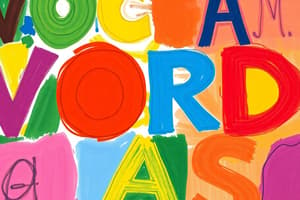Podcast
Questions and Answers
ما هي المهارة التي تعتبر أساسية لتطور مهارات اللغة اللفظية لدى الطفل؟
ما هي المهارة التي تعتبر أساسية لتطور مهارات اللغة اللفظية لدى الطفل؟
- القدرة على تكوين العبارات
- التمييز بين الأصوات المتشابهة
- الوعي الصوتي (correct)
- إتقان نطق الأصوات الأساسية
في أي عمر يكتسب الأطفال القدرة على إنتاج المقاطع الأساسية مثل /با/ و /دا/ و /غا/ بطلاقة؟
في أي عمر يكتسب الأطفال القدرة على إنتاج المقاطع الأساسية مثل /با/ و /دا/ و /غا/ بطلاقة؟
- بحلول سن الخمس سنوات
- بحلول سن السنتين
- بحلول سن الثلاث سنوات (correct)
- بحلول سن السنة
ما هي أحد الفوائد الرئيسية لتعلم لغة جديدة وفقًا للنص؟
ما هي أحد الفوائد الرئيسية لتعلم لغة جديدة وفقًا للنص؟
- تعزيز الفهم الثقافي
- جميع ما سبق (correct)
- تحسين فرص العمل
- تعزيز الكفاءة العالمية
ما هو المتوسط التقريبي لعدد الكلمات التي يكتسبها الطفل العادي بحلول عمر الخمس سنوات؟
ما هو المتوسط التقريبي لعدد الكلمات التي يكتسبها الطفل العادي بحلول عمر الخمس سنوات؟
ما هو التأثير الإيجابي الرئيسي للثنائية اللغوية على الأطفال والبالغين وفقًا للنص؟
ما هو التأثير الإيجابي الرئيسي للثنائية اللغوية على الأطفال والبالغين وفقًا للنص؟
متى يبدأ الرضع في تطوير مهارات اللغة وفقًا للنص؟
متى يبدأ الرضع في تطوير مهارات اللغة وفقًا للنص؟
Flashcards are hidden until you start studying
Study Notes
## Growth of Language Skills
Language skills play a crucial role in cognitive development, socialization, and communication. In this article, we will explore various aspects of language growth, including word formation in children, learning languages, and language development during infancy.
### Word Formation in Children
Children's ability to form words is essential for their language development. This process begins with phonological awareness, which refers to understanding how sounds combine to make words. As children grow older, they begin to recognize and produce simple syllables like /ba/, /da/, and /ga/. By age three, most children can produce these basic syllables fluently.
### Learning Languages
Learning a new language can benefit individuals in many ways, such as enhancing global competence, improving job opportunities, and fostering cultural understanding. Research suggests that bilingualism has positive effects on executive function, problem-solving abilities, and attention control in both children and adults. However, it is essential to introduce languages at young ages when neural plasticity is high.
### Language Development During Infancy
Infants start developing language skills from birth. Between six months and two years old, they typically say their first words, and by age four, they have mastered 400 to 800 words. At five years old, the average child has acquired approximately 11,000 words, while a typical adult knows around 40,000 to 50,000 words. Early language exposure is vital for children's academic success and overall cognitive development.
### Building Sentences in Children
As children develop their language skills, they learn to build sentences. Initially, they may start with single-word responses, followed by telegraphic speech consisting of isolated noun phrases. Eventually, they progress to using correct sentence structures, including subject-verb-object (SVO) patterns. Understanding and producing grammatical constructions helps children communicate more effectively and comprehend complex ideas.
Studying That Suits You
Use AI to generate personalized quizzes and flashcards to suit your learning preferences.




